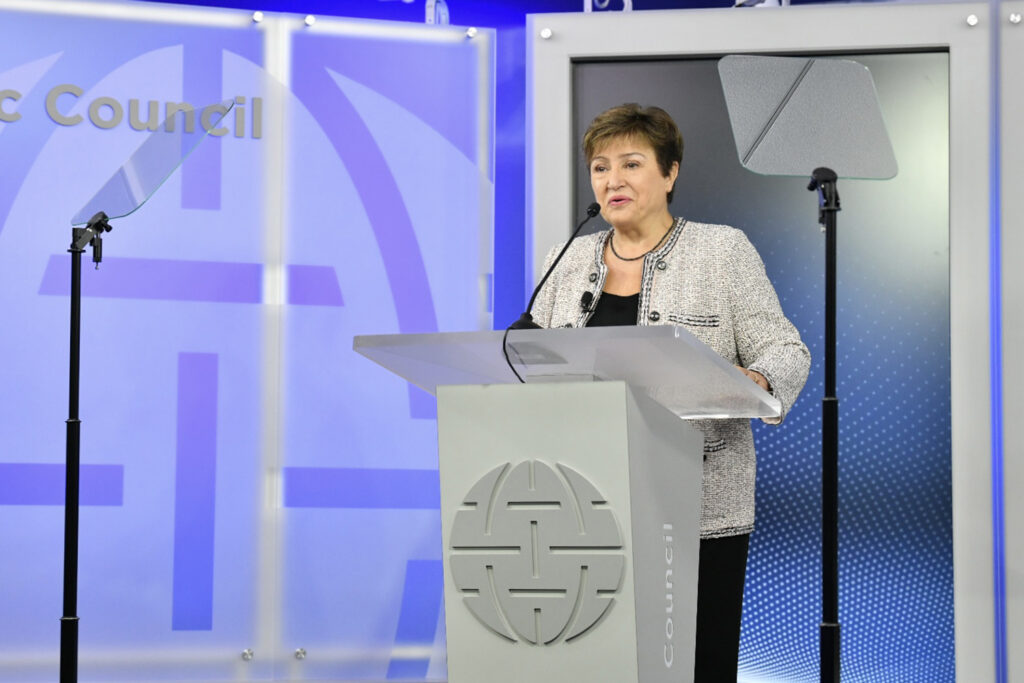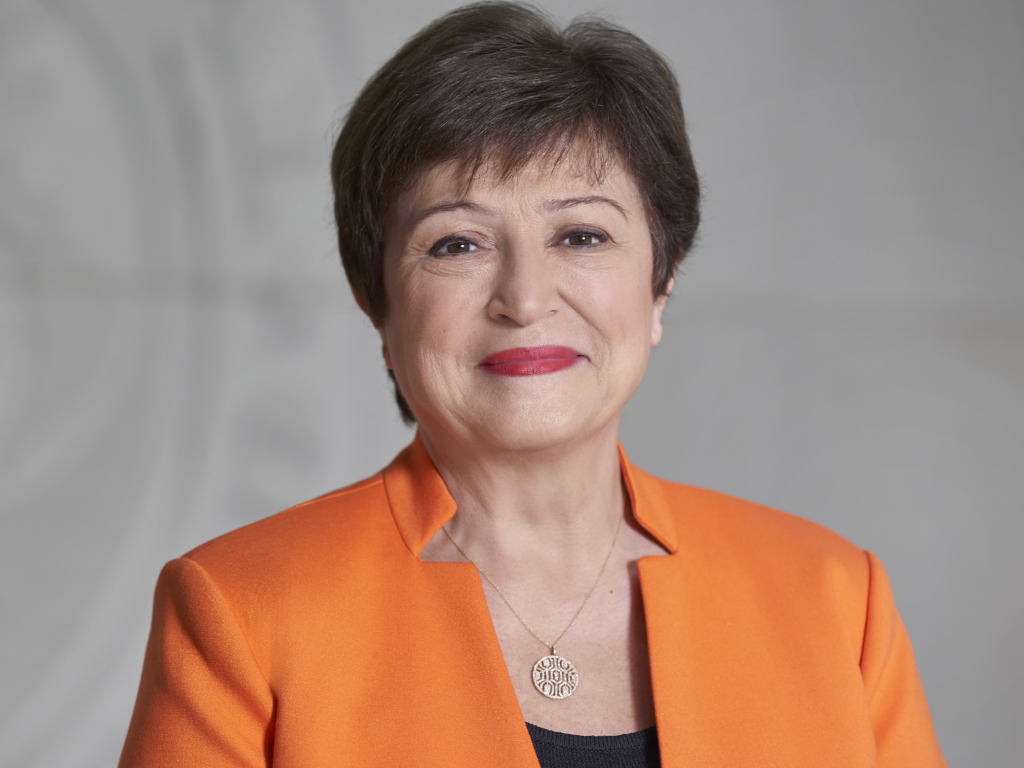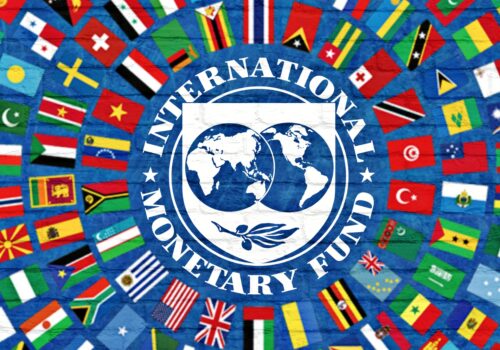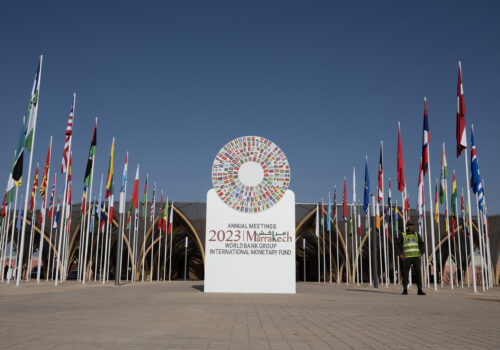Watch the full event
With global growth predicted to remain “well below” its historical average—at slightly above 3 percent—“making the right policy choices will define the future of the world economy,” International Monetary Fund (IMF) Managing Director Kristalina Georgieva said Thursday.
“The sobering reality is global economic activity is weak by historical standards,” inflation is “not fully defeated,” and fiscal buffers “have been depleted,” she explained at an Atlantic Council Front Page event ahead of the 2024 IMF-World Bank Spring Meetings. “Without a course correction, we are indeed heading for ‘the Tepid Twenties’—a sluggish and disappointing decade.”
Yet, there is reason for optimism, Georgieva argued while previewing an upgrade to global growth forecasts the IMF will release next week: Growth is “marginally stronger” thanks to “robust activity” in the United States and in many emerging-market economies, including an increase in household consumption and business investment and the easing of supply-chain problems.
Inflation is dropping “somewhat faster than previously expected”—a trend Georgieva expects to continue in 2024. While inflation is down in the United States, new data this week show that it may be creeping back up; “that is a concern,” Georgieva said, “but I think the [Federal Reserve] is acting prudently.” In response to some predictions that inflation would come down, propelling the Fed to cut interest rates this year, Georgieva cautioned “not so fast.” If the Fed has to then reverse course and raise rates, she said, that would undermine public confidence in monetary policy.
Yet on the other hand, high interest rates in the United States are “not great news” for the rest of the world. “High interest rates mean the dollar is also stronger,” which for other countries means that their currencies “are weaker,” she explained. “It could become a bit of a worry in terms of financial stability.”
Below are more highlights from Georgieva’s curtain-raiser speech and conversation with Atlantic Council President and Chief Executive Officer Frederick Kempe, touching upon the “good policies” needed to achieve a soft landing across the world and concerning economic trends in China.
Time for reform in China
- The IMF forecasts that China will see 4.6 percent gross domestic product (GDP) growth, just below Beijing’s target of 5 percent. But its productivity remains low, and it has an aging population. “China has to take on a new policy course,” Georgieva said. “What has worked in the past cannot be sustained for the future—and the Chinese leadership is aware of that.”
- Georgieva said that the IMF is slated to have consultations with China soon, where it will discuss what the managing director called three “solvable problems” for China: Low domestic demand, a need to reform its state-owned enterprises, and its real-estate crisis.
- On China’s challenges in the property sector, Georgieva said that while Beijing has taken some measures, it could “be more forceful” to let the market “decide on price,” and that it could also help support construction and “be more decisive” in dealing with failing companies.
- During a recent visit to China, US Treasury Secretary Janet Yellen stated that China is using unfair trade practices, a consequence of overcapacity, that hurt US businesses and workers. Georgieva said that China continues to face overcapacity problems in some sectors, making it “critical to develop domestic demand and shift the economy more towards services.”
- Georgieva estimated that when China drops 1 percentage point in growth, the rest of Asia drops about 0.3 percentage points. “China making good choices would be good for everybody,” she said.
“Expect the unexpected”
- “It is tempting to breathe a [sigh] of relief. We have avoided a global recession and a period of stagflation… but there are still plenty of things to worry about,” Georgieva said.
- She said to expect inflation to decline, albeit with “ups and downs,” and only some countries—mainly advanced economies—will be ready to begin cutting interest rates in the second half of the year. “This monetary pivot will differ from country to country,” she cautioned, as premature easing could lead to new inflation and monetary tightening. “No more [are we] in the place of 2020 when everybody went in the same direction,” she said.
- She added that policymakers will need to “deal decisively” with debt, as fiscal buffers “are exhausted,” and debt levels in many countries are “simply too high.” “For most countries, the prospect of a soft landing and strong labor markets mean there is no better time to act, to reach sustainable debt levels and build stronger buffers to cope with the shocks that will come in the future,” she said. “Delay is simply not an option: Consolidation must start now.”
- Georgieva also urged countries to adopt policies that reinvigorate growth and improve productivity, including policies that speed up the green and digital transformation. “How well we handle them will define the legacy of this decade,” she said.
- And with artificial intelligence (AI) poised to affect almost 40 percent of jobs globally, according to the IMF’s estimates, investing in digital infrastructure and introducing strong social safety nets could determine whether AI will enhance the economy, she said.
- “The pandemic, wars, geopolitical tensions: They have already changed the playbook for global economic relations,” the managing director said. “In a fast-changing and more turbulent world, bringing countries together to tackle challenges and pursue opportunities is more important than it has ever been.”
Watch the full event
Further reading
Tue, Apr 9, 2024
Breaking down Janet Yellen’s comments on Chinese overcapacity
Sinographs By Hung Tran
It is reasonable to criticize and complain to China, but policymakers should remember that an end to overcapacity would mean a major shift in China’s economic model—which is exceedingly unlikely.
Thu, Mar 28, 2024
Understanding the debate over IMF quota reform
Econographics By Hung Tran
The politics and mathematics of reform are tougher than they appear. A simple reform matching quotas to global economic weight will not be welcomed by many countries.
Mon, Mar 25, 2024
Making Africa a top priority for Bretton Woods Institutions
Econographics By Amin Mohseni-Cheraghlou
With deeper engagement of Bretton Woods institutions, African economies can seize the moment and become the engine of global growth.
Image: Kristalina Georgieva, managing director of the IMF, previews an upgrade to global growth forecasts during an Atlantic Council Front Page event on April 11.





